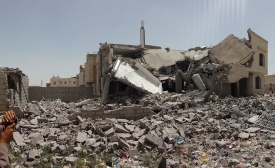international broadcasting
Beijing sees sporting prowess as a key soft power weapon and sensitivities over China’s performance at Rio 2016 led Chinese television censors to briefly stymie the BBC World broadcast about the plight of China’s gymnasts. The screen went black, as routinely occurs during stories considered politically inconvenient to the Communist Party.
America’s historical quest for freedom and democracy has been all but stamped out under the Obama administration in its quest to weaken American power, hard or soft. During Soviet times, Radio Free Europe and other Western media outlets did a good job of telling the world [...] We need to restore this vision and capability with similar, modern media efforts around the globe to tell the American story.
We’ll get a view of our presidential election from journalists and academics from Ukraine and Georgia and from a journalism professor here in the U.S. We’ll talk about media independence and bias; how Mr. Trump and Secretary Clinton are viewed in eastern Europe; how the debate about Russian president Vladimir Putin is playing in Georgia and Ukraine and elsewhere.

The media is failing to tell the full story, and that's part of the problem.
When Donald Trump repeatedly claims the election is “rigged,” it doesn’t just undermine voter confidence at home. [...] The campaign also acts as a snapshot of American democracy. According to political scientist Joseph Nye, America’s soft power – its ability to persuade foreign leaders and exert influence abroad – partly depends on how the rest of world interprets our political process, values and outcomes.
The training program [...] is not the first international project at top Chinese journalism schools. Since 2014, the School of Journalism and Communication at Renmin University of China has trained at least 10 journalists from African media each year in an exchange program organized by the China-Africa Press Center. This year, the program has received 28 African journalists, the largest group yet.
Xinhua organised the roundtable bringing together a select group of editors and publishers of both countries “to enhance communication and cooperation” between the two media ahead of the President Xi’s “milestone” visit. “We hope that media will play a positive role in enhancing relations between the countries,” said Tuo Zhen, Vice-Minister of the Publicity Department of the Communist Party of China’s Central Committee.
So far, American public diplomacy efforts directed at the North Korean people have remained almost entirely focused on radio broadcasting. [...] It is important to remember that the main focus would not be propaganda, but rather entertainment with an underlying goal to provide accurate, trustworthy information – the type of information can create change, particularly in such a closed-off environment.







